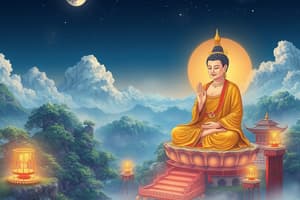Podcast
Questions and Answers
What is the meaning of the Sanskrit word Sangha?
What is the meaning of the Sanskrit word Sangha?
- Assembly
- Government
- Company
- Religious community (correct)
In what context was Sangha historically used?
In what context was Sangha historically used?
- To refer to a religious community
- To denote a group of scholars
- To describe a company of merchants
- To denote a governing assembly in a republic or a kingdom (correct)
Which religious associations have used the term Sangha?
Which religious associations have used the term Sangha?
- Buddhists, Jains, and Sikhs (correct)
- Buddhists only
- Sikhs only
- Jains only
What does Sangha refer to in Buddhism?
What does Sangha refer to in Buddhism?
According to which schools of Buddhism does the term Sangha not refer to the community of sāvakas or the community of Buddhists as a whole?
According to which schools of Buddhism does the term Sangha not refer to the community of sāvakas or the community of Buddhists as a whole?
What is the Sangha's role in Buddhism?
What is the Sangha's role in Buddhism?
What is the minimum number of possessions that Buddhist monks, nuns, and novices own?
What is the minimum number of possessions that Buddhist monks, nuns, and novices own?
Is it true that all Buddhists, especially Sangha members, practice vegetarianism?
Is it true that all Buddhists, especially Sangha members, practice vegetarianism?
What do some liberal scholars opine about the use of the term Sangha in the West?
What do some liberal scholars opine about the use of the term Sangha in the West?
Study Notes
Sangha: A Sanskrit word meaning religious community
- Sangha is a Sanskrit word which means "association", "assembly", "company" or "community".
- It was historically used to denote a governing assembly in a republic or a kingdom.
- Sangha has been used by religious associations, including Buddhists, Jains and Sikhs.
- In Buddhism, sangha refers to the monastic communities of bhikkhu (monks) and bhikkhuni (nuns).
- According to the Theravada school and Nichiren Shoshu Buddhism, the term sangha does not refer to the community of sāvakas (lay followers) nor does it refer to the community of Buddhists as a whole.
- The Sangha is the third of the Three Refuges in Buddhism.
- The Sangha was originally established by Gautama Buddha in the fifth century BCE.
- The Sangha also fulfils the function of preserving the Buddha's original teachings and of providing spiritual support for the Buddhist lay-community.
- Buddhist monks, nuns, and novices own a minimum of possessions due to their samaya as renunciants.
- The idea that all Buddhists, especially sangha members, practice vegetarianism is a Western misperception.
- Both Mahayana and Vajrayana traditions vary depending on their interpretation of their scriptures.
- Some liberal scholars opine that sangha is frequently (and according to them, mistakenly) used in the West to refer to any sort of Buddhist community.
Studying That Suits You
Use AI to generate personalized quizzes and flashcards to suit your learning preferences.
Description
How well do you know Sangha in Buddhism? Test your knowledge of the monastic communities of bhikkhu and bhikkhuni with this enlightening quiz. From its historical roots to its role in preserving the Buddha's teachings, discover the significance of Sangha in Buddhism and challenge yourself on the misconceptions surrounding it.



